Where does this myth come from?
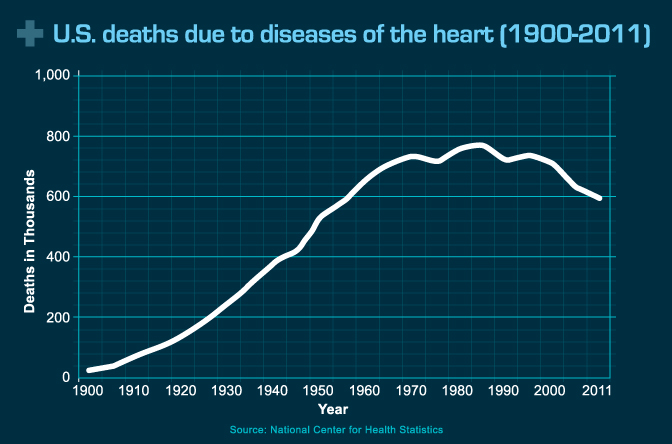
In the 1950s, the number of heart attacks were quickly on the rise, and people were panicked. A researcher named Ancel Keys had this idea that saturated fats and cholesterol were to blame. He looked at the diets and lifestyles of people in seven different countries, and reported that eating more saturated fat leads to increased heart attacks and strokes.
This seemed to match autopsies of heart attack and stroke victims, where they would find arteries that were clogged with something called low-density lipoprotein (LDL). By the way, you’ll hear a lot of people say there’s good choleseterol (HDL) and bad cholesterol (LDL). This is a misnomer, these lipoproteins are actually carriers of cholesterol. Since cholesterol is fat-soluble, your liver makes these lipoproteins to shuttle cholesterol around your body.
Anyway, more studies came out in support of Keys’ findings, and the American Heart Association (AHA) issued guidelines for people to reduce saturated fat. Here was the train of thought:

Why does your body have to shuttle cholesterol around?
Cholesterol is a very essential building block that is responsible for all of these things:

Repair
Your body keeps some cholesterol in excess, and in times of stress it uses LDL to shuttle cholesterol for blood clotting and wound healing.
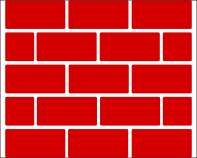
Structure
Cholesterol makes up 30 % of the cell membranes for all the cells in your body. Your body would turn to potato salad if you didn't have it.

Digestion
Helps make bile, a detergent that breaks down fats and allows you to absorb vitamins like D3 and K2, which are both important for heart health.

Hormones
Helps make vital steroid hormones which regulate sexual development, brain function, aging, and immunity.

Neuroprotection
Helps make the mylein sheath that connects neurons. Rates of dementia decreased when patients had higher cholesterol.

Ok, so maybe we just eat too much cholesterol-rich saturated fat?
Actually no. Your liver already makes 2000-3000 mg of cholesterol, or 80 % of your dietary needs. That’s like eating 14 eggs. Furthermore, your body isn’t very good at absorbing cholesterol from your diet, so eating more cholesterol-rich saturated fats won’t have much of an effect.
So then why is LDL clogging our arteries?
People have misunderstood the scene of the crime. What’s happening is, there is lot of damage in the body, so your body is trying to repair it. It sends LDLs to shuttle cholesterol, the building blocks it needs to make the repairs. Because your body in under stress, it makes oxidative compounds, which oxidizes the big and fluffy LDL molecules to become small and sticky []. These sticky LDLs are more likely to get stuck in the arteries, and form plaques. [insert picture of clogged arteries with sticky LDL]
To draw this out further, let’s look at studies of people with familial hypercholesterolemia, a genetic disorder that leaves people with 2-3x more cholesterol than normal. They found that saturated fat consumption had no effect on their risk of dying from heart attacks. Instead, they found that higher levels of clotting factors like fibrinogen did.
Producing oxidative compounds and clotting factors are byproducts of inflammation.
What's causing inflammation?
I should back up and say that inflammation isn’t inherently bad either. It’s your body’s natural response to stress. But when your body is chronically under stress, it leads to chronic inflammation. Which is not supposed to be normal. Chronic inflammation is linked to mental stress, smoking, obesity, sugar, and believe it or not, polyunsaturated fats, the very thing we used to replace saturated fats! Cooking with polyunsaturated fats at high heat is known to release free radicals, which are oxidizing compounds.
I know we have to be careful about correlation = causation assumptions. After all, it’s exactly that sort of assumption that led us to believe that LDL is inherently bad because it is found in clogged arteries. But take a look at these trends below. Across the 1900s, we find more consumption of unsaturated fats like margarine and vegetable oil shortening. We see a steady rise in sugar consumption. We see a trend in smoking that very closely fits the trend of heart attack deaths. The only trend that goes in the opposite direction to heart attack deaths, is the consumption of saturated fats like butter and lard.
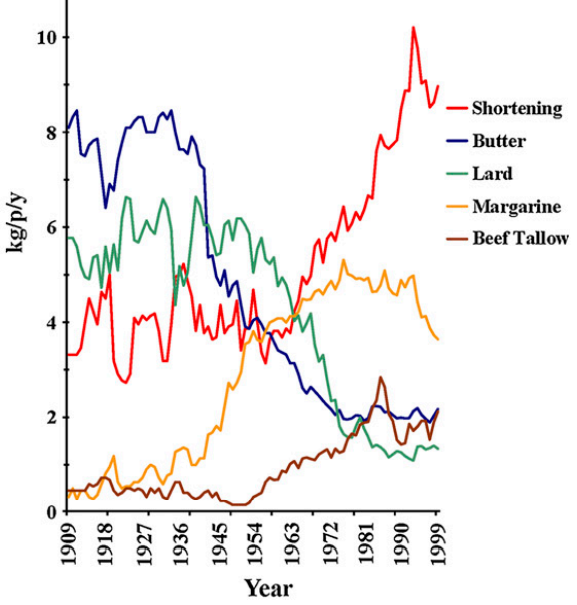
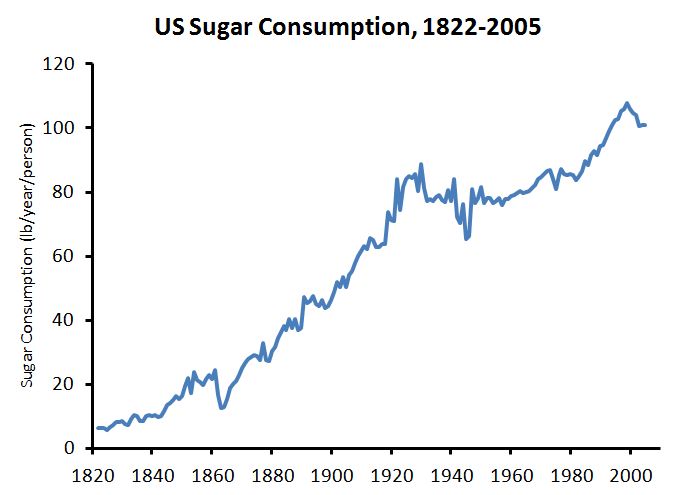


Why do people still believe saturated fats cause heart attacks?
A little bit of a history lesson here:
- 1911 – P&G launched Crisco, a trans-fat shortening that was marketed as being made entirely of vegetable oil. It had a much longer shelf-life than butter. It had a neutral smell unlike lard. It was also much cheaper because of industrial innovations. Through an aggressive ad campaign, P&G was selling more than 60 million cans of Crisco per year to American households, making it a ubiquitous product that displaced saturated fats. People trusted the Crisco brand. They didn’t care how it was made.
- 1948 – P&G donated $1.5 million to the American Heart Association. This helped the small, underfunded cardiologist organization to go national.
- 1955 – President Eisenhower had a heart attack and he was treated by the most respected physician of the time, Paul Dudley White. Meanwhile the public goes into a state of panic. People were as afraid of heart attacks as we were to COVID-19. About 30-40 % of patients would die from this mysterious illness, and doctors didn’t know what was causing it and how to treat it.
- 1961 – Ancel Keys made the cover of TIME magazine, and tells people that eating saturated fat causes heart attacks. Of course, the fear-stricken public ate it up. He also gets on the nutrition committee of the American Heart Association. This committee issues the first national guideline recommending that people should limit their saturated fat intake. That guideline is still there to this day. People naturally switched over to vegetable oils because as far as they knew, there was no problem eating a ton of that.
How did we get it so wrong?
- The Seven Countries Study: This is the study Ancel Keys used to make his conclusion about saturated fats. It was a big undertaking at the time, but by today’s standards this study should be thrown in the garbage. For example, Keys had looked at a total of 22 countries, and when you put them back in, the correlation between saturated fats and heart attacks becomes much weaker. Additionally, the thing about epidemiological studies is that there are way too many variables. They can only show correlation, not causation. Keys narrowly fixated on the saturated fat correlation with heart attacks, but ignored the fact that eating more saturated fat improved survival rates from pretty much every other disease, as shown in a rebuttal paper by Yerushalmy and Hilleboe. A re-analysis of Keys’ data shows that sugar consumption is a better predictor of risk of heart attacks than saturated fats.
- Minnesota Coronary Experiment: By contrast to the Seven Countries study, this one is an extremely rigorous double-blind controlled clinical trial. The experiment was done in mental institutions where they could control the diets of each patient. One group got saturated fat, the other group got unsaturated fat. They were trying to confirm Keys’ findings, and the results did show that the unsaturated fat group had less cholesterol in their bodies. But to their surprise they were not able to conclude that this leads to death. If anything, less cholesterol led to more heart attacks.
- Sydney Diet Heart Study: This was another randomized controlled trial that confirmed the results of the Minnesota Coronary Experiment. The group with the unsaturated fat diet had more deaths from heart attacks, and deaths overall.
What do I do now?
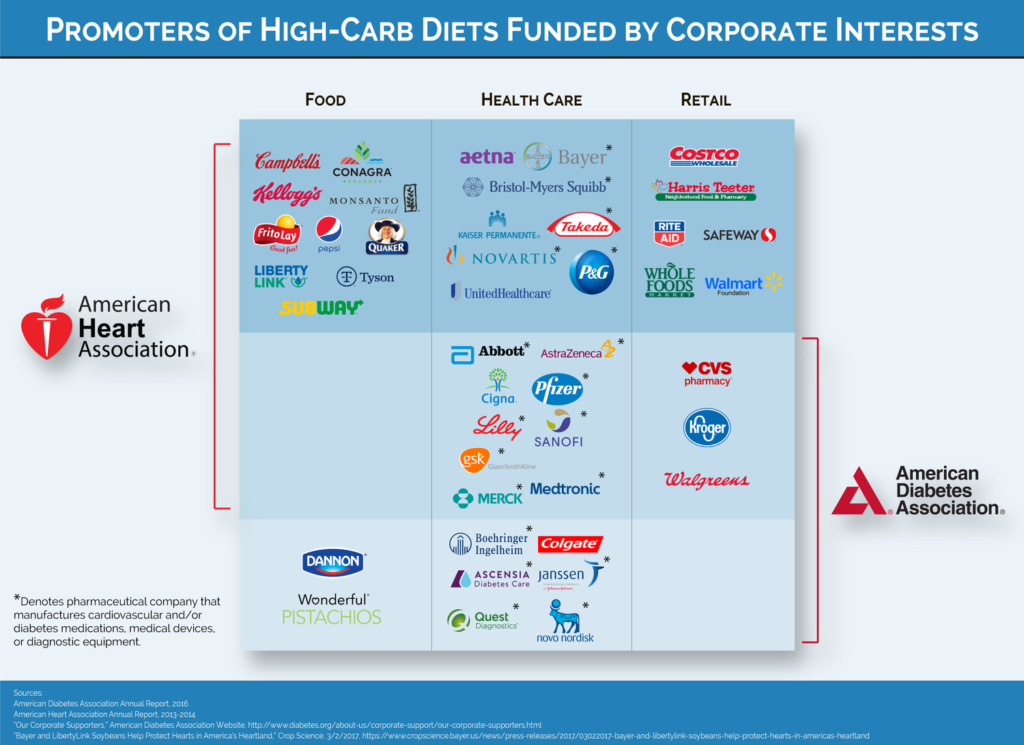
My recommendation is that if you do cook a lot of things in vegetable oil and other polyunsaturated fats, try reducing it, and switch to foods that are high in saturated fats like butter and cheese. If you still aren’t convinced, try monounsaturated fats like olive oil and avocado oil. Try it for a month, see how you feel.
My recommendation is the same in all of my articles on nutrition: reduce chronic inflammation, especially by sharply cutting carbohydrates. If you’re a smoker, drink lots of alcohol, and are incredibly stressed, of course we have to find ways to reduce/eliminate those things. But most people don’t realize just how much sugar impacts the body. It’s ubiquitous and addictive. My goal is to help people have the most robust bodies they can have, so that they don’t have to constantly go to the doctor and get long-term medications. Food is supposed to be your medicine, and over this series of nutrition posts hopefully I can help carve a pathway toward healthy eating.